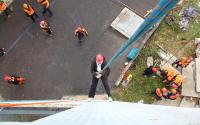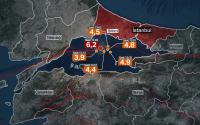Bakunin said revolutions were made by people with the demon inside. He meant the rage and hatred of the most oppressed social strata towards the system. Since his debate with Marx on the revolutionary subject, most leftist analysis has continued from their two different theoretical approaches. At heart the differences between them revolved around the optimal level of oppression needed for a social group to rise and act as a motor for the transformation of society. For Marx the lowest layers of society - the lumpen - were more prone to counterrevolution than to revolution. Only the industrial workers occupied a viable position for the generation of an organized and conscious class. Bakunin argued that the lumpen and peasantry constituted the sectors less exposed to the influence of bourgeois civilization and, consequently, the best equipped with the necessary instincts for rebellion. | |
Both theoretical lines have continued to claim the central role in subsequent revolutions and rebellions for their respective social layers. Which social segments impelled the Mexican, Soviet, Chinese, Cuban and Spanish revolutions, the social insurrection of May '68, the anti-colonial fights or the uprising of ethnic minorities in the USA, South Africa or Chiapas? Not all Marxists or post-Marxists have maintained Marx's perspective in this discussion. Authors like Marcuse, Negri or Zizek are closer to Bakunin's line, whereas others like Gramsci, Althusser or Balibar have remained faithful to Marxist orthodoxy. Recent class fighting in the French suburbs has reanimated the important debate on the revolutionary subject. Nothing better than fire to throw light on the social structure of 21st century global capitalism. An interesting paradox emerges in this case. On the one hand the rebelling body of the French suburbs looks like the one advocated by Bakunin. Capitalism is no longer able to reform anything or solve any social problem. It cannot return, even with the aid of social democracy and colonial resources, to the Keynesianism of the third quarter of the 20th century. The message sent to the suburbs on the part of French plutocrats, the US empire, Bush and his band of gangsters with their secret jails, torture centres and concentration camps is very clear: we do not care about the Enlightenment, French Revolution or Human rights; your fate is misery and periodically we will arrest, beat and kill you to keep you in line and confront you with xenophobia and social rejection. In this scenario, the most oppressed and enslaved part of the population makes its voice heard as it has always done in history: resorting to the means at its disposal to express its protest. Since it cannot respond to its oppressors with the same weapons - it cannot bomb, shoot or jail them - it burns cars and breaks windows. A good part of the middle and higher classes and their hired intellectuals - which, faithful to their tradition, would not hesitate for a second to kill anyone who dared to attack their private property - denounce the violent and apparently irrational behaviour of the plebs. Many analyses from the left fall into this politically correct, racist and pedantic discourse as well: since the kids from the suburbs do not express themselves with references to Marx and Rousseau, they deduce that they lack rationality, political objectives or utopian thought. It is understandable that many intellectuals and academic radicals think this way. Their distance from the physical and mental world of popular layers is so great that they would need years of research to approach the understanding of the oppression that any kid in the banlieus already has. Who has more class consciousness, the trade union affiliate voting in favour of the European constitution or the kid facing racist police in the suburb? Which behaviour is more progressive, burning cars on the streets as protest or waiting passively and eternally for liberal democratic institutions to solve the problems of poverty and the ostracism of millions? Does anybody seriously think at this point that without resorting to violence the crowds of the peripheries would receive the slightest attention from terrorist governments and fascist privileged classes? On the other hand, the revolting social groups are basically identical to those of the French Revolution, in the same districts and streets. They are more similar to the working class of the end of the 19th century than to the wild mob described by the oligarch's media. With the difference that now in Paris and other capitals not only the nobility looks at these working classes with disgust, but also the liberals, now totally conservative, the social democrats, today fully liberal, and even the upper echelons of leftist organizations with their official cars and offices, currently completely social democratic. They all accuse the rebels of lacking demands and organization. They are obviously incapable of understanding that the fight of the slaves to free themselves from slavery does not require additional justifications. Nowadays the working class is structured in three main sociological layers. The first layer is composed of the labour aristocracy: settled civil employees of the public sector and employees or autonomous workers of the private sector. The second level is populated by the great mass of precarious employees and autonomous workers without labour rights in public and private spheres. They work in lamentable conditions in exchange for nibbled surpluses and a complete scorn. They fight to avoid falling to the third level, the one of the marginalized, unemployed, handicapped and immigrants, whose life is superfluous to the system. The only treatment they receive from the rest of society is kicks and insults. Between the second and third levels there is a great rotation and permeability. The first level is, with its traditional unions and parties, totally disconnected from the other two. For that reason a theoretical proposal like Negri's multitude, a kind of global proletariat emerging as a dialectic counterpart to the creation of a global empire, is seriously misguided. No matter how much we insist on looking for the lost unity of the working class, the fact is that, far from being reconstituted in the form of a new global revolutionary subject, in the last decades it has been deeply fragmented. In order to raise again the flag of socialism from the abyssal pit it has fallen into, we must start by analyzing reality as it is, not as we would like it to be. In my opinion, a synthesis is needed between the two classic positions of the debate on the revolutionary subject, Marx's and Bakunin's. Without the wrath, rage and fury of the most subjugated layers, without its greater understanding of oppression and the brutal nature of the social order, without its will of destruction of the system acting like the motor of revolt, there will be no revolution. Neither will there be one without the greater organization of the other working classes, their unions, their parties and their capacity to take control of the main system's centres of power. Both revolutionary subjects are necessary and should learn to respect each other more. Marco Antonio Esteban is a professor and activist living in Barcelona. He can be reached at: [email protected] . | |
The French Suburbs and the Revolutionary Subject
23 Ocak 2006
-
Aa
+
a
a
a






